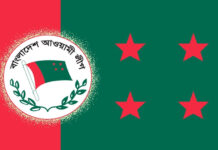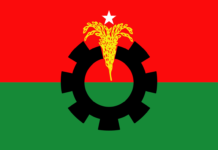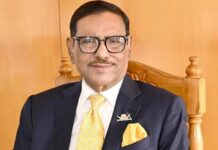An ambitious unity

The national unity process has many hopes, flaws, and aspirations
At 81 years old, Dr Kamal Hossain seems frail and physically unwell — nevertheless, the veteran has outwardly stepped into the shoes of being the voice of the political opposition, that too against the very Awami League he was a crucial part of, until 1992.
85 years old and witty as ever, former President and the founding general secretary of the BNP, Dr AQM Badruddoza Chowdhury, does not lag far behind — both are at the centre of discussion in the pre-election scenario existing in Bangladesh.
Much of the abstract acknowledgement for this so-called “national unity process” must be given to the efforts of both these octogenarians in their quest to ensure a balance of power in our political system.
Yet, the absence of former Prime Minister and BNP Chairperson Begum Khaleda Zia in oppositional politics has made it possible for both these veteran public figures to step out of their comfort zone, and be politically more relevant.
“Can they make a difference?” most ask. Well, the fact that we are consistently talking about them is an indication of how and why they are indeed influencing, if not changing, the political landscape.
The Dr Kamal Hossain-led national unity process, termed the “Jatiya Oikya Prokriya,” announced an 11-point goal, which in essence calls for a greater power balance between the different hierarchies whilst aiming to work towards the realization of key aspects of what a democracy looks like.
The 11-point goal encompasses crucial aspects of our democratic system which should indeed be revisited. The question of ensuring a check on the absolute power of the prime minister, whilst evaluating the prerogatives of the president, are all issues which need to be paid attention to.
Having said so, the problem which citizens have with the unity process, is the seeming disunity and confusion between their very architects.
Dr Badruddoza Chowdhury-led “Bikalpadhara Bangladesh” has been left out in their newly announced alliance — and in a platform strengthened by individual credentials, rather than a potential voting bank, the BNP and its newly found allies may lose credibility in the absence of the former president.
It is obvious that Dr Chowdhury has reservations about Jamaat-e-Islam and its continued engagement with the BNP — and it is somewhat positive to see him stick by his original position.
But, it is in the interest of this unity process to include Dr Badruddoza Chowdhury in their framework.
Whereas in terms of the upcoming parliamentary elections, his party, like those of Dr Kamal Hossain, Mahmudur Rahman Manna, and ASM Abdur Rab, carry little to no influence in electoral politics, it is important to recognize that their accumulative personalities and images can act as a pressure group against the Awami League.
Recently, Prime Minister Sheikh Hasina summed up the unity process well. She suggested that there are two platforms in contemporary Bangladesh: Awami League and anti-Awami League.
This could not be truer considering today’s political scenario. In the absence of Begum Zia, the BNP lacks leadership, guidance, and is undoubtedly in an image crisis.
The very basis of the BNP, and how General Ziaur Rahman constructed the party in the late 1970s, stemmed from anti-Awami League sentiments across the left, right, and centre of the erstwhile political classes.
With the Awami League amassing what is unquestionably its most strengthened hold on power in independent Bangladesh, it is not surprising to see the BNP engaging with other anti-government individuals.
Around the unity process, there have been efforts to initiate a progressive brand of politics through social media and mobilization campaigns. Mahi B Chowdhury’s Plan B has received traction across social media groups, with the former MP reaching out to youth groups in the hope of mobilizing young Bangladeshis.
Leftist politicians in the country have, under the leadership of the likes of Zonayed Saki, activated small-scale programs across the country in trying to work towards what they perceive as a more democratic society.
Yet there remains disharmony in philosophies, approaches, and ideologies.
The Awami League knows very well that a repeat of the 2014 elections is unlikely — along with the BNP, other smaller groups who boycotted the parliamentary elections four years ago, are likely to participate in the upcoming polls.
A common question asked is whether those in this so-called unity process and the anti-Awami League front have electoral support amongst the masses, barring the BNP. The reality is they do not.
The reality is that compared to BNP and Awami League. the likes of Dr Hossain and Dr Chowdhury do not have the financial resources, nor the muscle power, to hire people for their rallies.
The reality is, our politics is based on numbers rather than philosophies.
The reality is, that whilst citizens in our country have questioned, lambasted, criticized, and unrelentingly opposed the violent practices of our two major political parties, the electorate themselves have ended up voting the Awami League and the BNP to power.
The reality is, that when other groups try and impact politics in our country in a different vein, we segregate them, and question their very legitimacy.
The likes of Dr Hossain and Dr Chowdhury do not have a stainless history when it comes to politics — they have their share of hypocrisy which we cannot ignore. Sometimes, it may be worthwhile to self-reflect as citizens, and see whether it may be appropriate to give those beyond the two-party system a choice to influence, if not lead, our political system.
An alliance comprising of our constitutional architect, a firebrand student leader, a valiant freedom fighter, and one of our two major political parties, should be welcomed, if not supported wholeheartedly.
If we have given the Awami League and the BNP the benefit of the doubt for so many years, maybe it is time we give these groups an opportunity to do what they can, and judge them for their actions in the future.
It is up to the leaders of the unity process to showcase progressivism in their activities in the coming days, and live up to their theoretical goals, above and beyond getting the Awami League out of power, and make their impact in establishing a democratic, liberal, and inclusive Bangladesh.
Mir Aftabuddin Ahmed is a freelance contributor and a graduate in economics and international relations.









